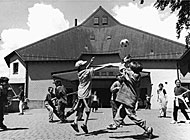Swiss Steiner Schools look for public financing

Rudolf Steiner schools in Switzerland are celebrating their 75-year-jubilee this year with calls for more funding amid a deepening financial crisis.
They are among the oldest representatives within the worldwide Waldorf School System that is widely recognised for its pioneering role in educational methods.
“The situation is bad, and getting worse”, said Robert Thomas, a teacher in Zurich and head of the co-ordinating committee of Swiss Steiner schools, at Thursday’s presentation of the jubilee festivities.
Steiner schools are considered strictly private schools in Switzerland and receive almost no government funding. While this was once considered the cost of a complete (and otherwise proudly upheld) organisational independence from the state school system, Steiner schoolteachers say that the situation has now changed.
Of an overall turnover of SFr54 million in 1999, Swiss Steiner schools made a deficit of SFr1 million, which is expected to have grown in the past year. One school, in Neuchatel, had to close due to a lack of funds.
Steiner schools therefore see their 75-year-jubilee not only as a cultural event, but as a fund raising operation too. Whereas they were often reluctant in the past to expose themselves to public debate, the schools are now lobbying politicians in the various cantons where they exist.
While their number is still growing internationally, reaching 750 schools in 50 countries worldwide, most of the 39 Swiss schools with 8,000 pupils are struggling with a financial crisis.
A “Basel Manifesto” that will be signed by parents, teachers and sympathisers at a public congress in Basel on January 14 states that while federal and cantonal constitutions guarantee parents the freedom to choose which school system their children should attend, cantons “restrict this same freedom through economic means.”
The decentralised Swiss school system is run by the 26 cantonal governments and financed by cantonal tax systems. Steiner schools argue that parents who send their children to their schools have to “double-pay” on school fees – first by paying their income tax, then by paying the Steiner school fees, which are between 10 and 13 per cent of a household’s income.
The Basel Manifesto demands “fairness” towards Steiner school parents. It says that cantons should finance all independent primary schools that operate on a non-profit basis as long as they are recognised and overseen by the educational authorities.
Swiss Steiner schools point to the fact that Waldorf schools in Germany, the Netherlands and in Scandinavian countries receive between 70 and 100 per cent of their income from government.
Steiner schools, or Waldorf schools as they are called in other countries, follow the educational principles of the Austrian philosopher Rudolf Steiner (1861-1925).
They place high importance on the psychological development of the individual child and try to foster creativity. Depending on the age group, Steiner school curricula dedicate up to one third of school hours to arts and handicraft instruction.
The jubilee festivities, which include concerts, debates and exhibitions, take place throughout the year at various venues in Basel – the city where the first Steiner school in Switzerland was established in 1926.
The first Waldorf School was established in Germany just after the First World War. But because the movement was outlawed in Germany during the Nazi years, the first Steiner schools (Zurich and Bern got theirs shortly after Basel) have been in operation longer in Switzerland than anywhere else.
Swiss Steiner schools are keen to use their jubilee year to dismiss some of the prejudices with which they are confronted, and to emphasise their pioneering role in educational methods.
“Right now, the state systems spends millions to ponder the question whether to introduce second languages into the curriculum at an early stage”, said Walter Kugler, an educationalist at the Steiner teacher’s training college in Dornach near Basel. “They should ask us – we’ve been teaching second languages from class one for 75 years.”
Other areas where Steiner schools are decades ahead of the state system are gender co-education, instruction in the arts, and project-based instruction.
If Steiner schools were ever elitist, the charge is certainly not true anymore, jubilee organisers say. A recent survey of the school in Zurich for instance revealed that 27 per cent of the parents are single mothers – a situation that contributes to the financial crisis.
The 75-year jubilee activities in Basel begin with a public congress on January 12 to 14 in the Stadtcasino or concert hall. On May 19, the jubilee will be celebrated in the presence of public dignitaries at Basel University. On June 16, alumni are offering an open party within the walls of the Basel school.
by Markus Haefliger

In compliance with the JTI standards
More: SWI swissinfo.ch certified by the Journalism Trust Initiative
You can find an overview of ongoing debates with our journalists here . Please join us!
If you want to start a conversation about a topic raised in this article or want to report factual errors, email us at english@swissinfo.ch.